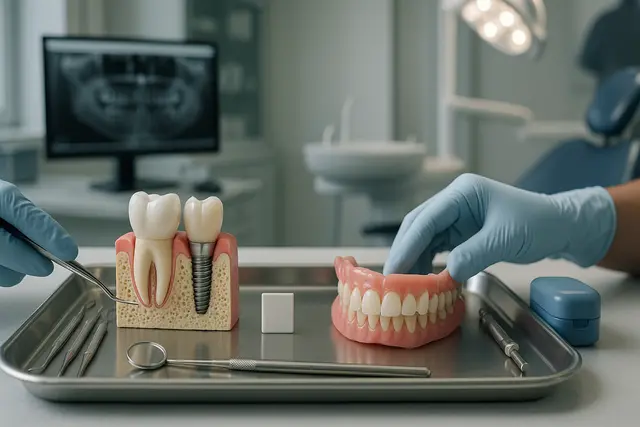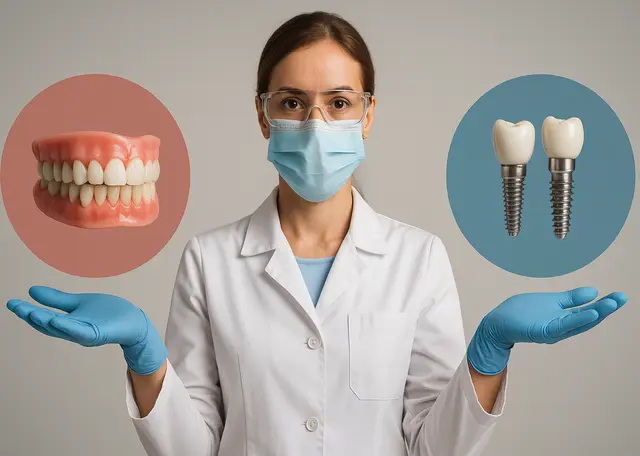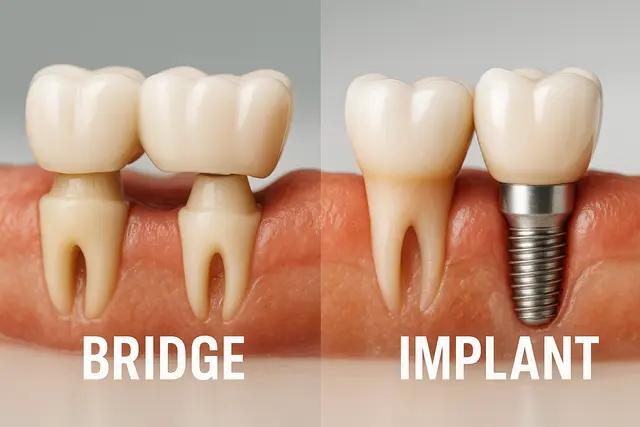Prosthodontics
6 min read
Aug 17, 2025
Crowns for Teeth Cost: Types, Materials, and Price Differences
When it comes to dental care, few treatments are as common, and as varied in price, as dental crowns. Whether used to protect a damaged tooth, restore function after a root canal, or improve appearance, crowns play a vital role in modern dentistry. Understanding the different types, materials, and costs involved can help patients make informed decisions about their oral health and budget.

A dental crown is a cap that goes over a tooth when it’s seen better days. Crowns are typically custom-made to fit your smile like a glove. A crown may be needed for various reasons: to protect a weak tooth, cover a dental implant, support a tooth with a large filling, or just make your smile look like a million bucks (without actually costing that much, more on that in a sec).
Breaking Down the Real Cost of Dental Crowns
Let’s not dance around it, crowns aren’t cheap. But understanding the breakdown makes the dental crown cost feel a bit less mysterious. The crown cost depends on several things: the material used, the location of the dental office, the type of dental insurance you have (if any), and whether it’s on a back tooth or one of those prized front teeth that everyone sees.
On average, the cost of a crown ranges from $800 to $2,500 per tooth. Yep, per tooth. The wide range comes down to the crown material, whether you're getting a temporary crown before the permanent one is placed, and how much your insurance provider chips in.
Types of Dental Crowns and Materials That Affect the Cost
When it comes to the types of dental crowns, you’ve got options. Like picking a car or a mattress, what you choose affects the ride (and the cost).
Porcelain and Ceramic Crowns: Great for front teeth. These look the most like natural teeth and are ideal for folks allergic to metals. Ceramic crowns blend well but cost more, averaging $1,000 to $2,500 per tooth.
Metal Crowns: We’re talking gold alloy crowns or other metal blends here. They're durable champs, perfect for back teeth where looks aren’t everything. Metal crowns can run from $900 to $2,500 per tooth.
Porcelain-Fused-to-Metal (PFM) Crowns: The best of both worlds. PFM crowns look like natural teeth but have a metal base for added strength. They typically cost $800 to $1,800.
Resin Crowns: These are wallet-friendly but less durable. Often used for temporary crowns, resin options usually cost around $600 to $1,000.
Zirconia Crowns: Durable, pretty, and increasingly popular. Zirconia blends strength with aesthetics and costs between $1,000 and $2,500.
There are many different types of crowns out there, and each type of crown offers different benefits. Some are better for aesthetics or strength. What’s best for you depends on your tooth's needs and your budget.
How Much Do Dental Crowns Cost With and Without Insurance?
Let’s tackle the biggie: how much do dental crowns cost with and without insurance?
With dental insurance: If you have a decent dental insurance plan, you’re in luck. Many dental insurance plans cover 50% of major dental procedures, including crowns. So if your crown is $1,200, you might only pay $600 out of pocket, after your deductible, of course. Coverage for dental crowns also depends on whether the procedure is considered medically necessary or cosmetic.
Without insurance: If you’re going it alone, the dental crown can range from $800 to $2,500. That’s the cost of a dental crown without dental insurance, and it stings. However, there are still options for dental savings, like dental discount plans or paying through a dental school clinic. They offer lower dental fees for high-quality care.
Getting a Crown Isn’t Just One Appointment
The crown procedure involves a few steps, not just a one-and-done situation. First, your dentist will do a dental exam and prepare the tooth, which might include filing it down or building it up if it’s too damaged. You’ll receive a temporary crown to protect your tooth while your permanent one is being made. That temporary crown may not feel amazing, but it gets the job done.
Once the permanent crown is ready, usually in a couple of weeks, you’ll head back to have it placed. The crown is made in a lab, customized to fit your bite and match your natural teeth. When it’s crown installation day, your dentist removes the temp and cements the new one in place. And just like that, your tooth is whole again.
Affordable Dental Crown Options Exist
If you’re thinking, “I need a crown but can’t afford it,” don’t give up hope. There are ways to find an affordable dental crown, even without insurance.
Dental schools: Training dentists provide supervised care at a lower cost.
Dental discount plans: Not insurance, but they offer reduced rates at participating dental offices.
Financing: Many dental offices offer payment plans, CareCredit, or third-party financing.
Insurance plans: Even basic insurance plans often help cover the cost of dental crowns, especially if the tooth is damaged and the procedure is necessary.
Some individual dental or family dental insurance coverage can significantly reduce the actual cost. And if you’re part of a dental group plan through work, even better. Many dental offices will help you understand your insurance provider's benefits and figure out the most affordable route.
How Long Does a Crown Last and What Affects the Cost?
Wondering how long your investment will last? The average crown lasts 5 to 15 years, depending on the material, your bite, and how well you care for it. Some crowns, especially gold or zirconia, can last 20 years or more.
What can affect the cost?
Tooth location: Back teeth usually require tougher materials.
Material used: Gold alloy is durable but pricey; porcelain is beautiful but fragile.
Dental office location: A crown in Manhattan costs more than one in Minneapolis.
Type of dental crown: Each has its own price tag, and your choice affects the overall cost.
Dental insurance coverage: Whether you have dental insurance can be the biggest factor.
Dental procedures required: Sometimes you need additional dental treatments like root canals or dental fillings before a crown can be placed.
All of this means your total cost will also vary.
Why You Might Need a Crown and What It Fixes
Let’s say your tooth took a beating, maybe from grinding, decay, or just bad luck. You might need a dental crown to restore it. Crowns are used when dental fillings won’t cut it. If you’ve got damaged teeth or had a root canal, you’re a prime candidate.
You might also need a crown after a dental implant procedure. The implant acts as a root, and the crown sits on top. Without a crown, the implant is just...there. So to finish the job, you get a dental crown placed.
Other times, you need a crown simply because the tooth is worn down. Whether it’s from age, injury, or life in general, getting a crown can save a tooth from more serious issues.
Dental Crown Procedure and What It Involves
Let’s walk through the crown procedure. The crown involves several stages:
Exam and Preparation: Your dentist checks the tooth and may need X-rays.
Shaping the Tooth: The tooth is filed down or built up.
Impression: A mold or digital scan is taken for the crown.
Temporary Crown: You receive a temporary crown to wear for 1–2 weeks.
Crown Installation: The crown is ready, and your dentist cements it in place.
Voila. You’re back to chewing, smiling, and living like a champ.
What Factors Affect the Cost of a Dental Crown?
The cost of a dental crown depends on several factors, including the material, resin is cheaper but less durable, while zirconia or porcelain fused to metal offer better strength and appearance at a higher price. The tooth’s location also matters, as molars need stronger crowns, while front teeth prioritize aesthetics. Additional procedures like exams, fillings, or temporary crowns can increase the total cost. Regional pricing differences also play a role.
How Much Do Dental Crowns Typically Cost?
On average, a dental crown can cost between $800 and $2,500 per tooth. The wide range comes from the type of crown, the dentist’s expertise, and where you live. Metal crowns, while durable, can be less expensive than zirconia or porcelain crowns that prioritize appearance. Patients without insurance usually pay toward the higher end of the spectrum, while insurance may significantly reduce out-of-pocket expenses if the crown is considered medically necessary.
Does Dental Insurance Cover Crown Procedures?
Dental insurance may partially cover the cost of a crown, especially if the procedure restores a damaged or decayed tooth. However, coverage is less likely if the crown is placed for purely cosmetic reasons, such as replacing an older crown just for appearance. Insurance plans differ widely, so it’s important to review your benefits and check with your provider before treatment. Some patients also use dental savings or discount plans to help manage the cost.
How Long Does a Dental Crown Last and What Affects Its Lifespan?
A well-made crown can last 10 to 15 years or longer with proper care. The lifespan depends on the material chosen, oral hygiene habits, and lifestyle factors like teeth grinding or chewing hard foods. Regular dental check-ups and avoiding habits that put extra stress on the crown can extend its durability. Even though crowns are strong, they may eventually need replacement if they chip, loosen, or if the underlying tooth develops new issues.
Read Next
Related Posts

Prosthodontics
Implant vs. Dentures Pros and Cons: A Deep Dive into Modern Solutions
Missing teeth can impact more than just your smile, they can affect how you eat, speak, and feel about yourself. Fortunately, modern dentistry offers two leading solutions to bring back both function and confidence: dentures and dental implants. Understanding the pros and cons of each can help you make the choice that fits your needs, lifestyle, and budget.
7 min read
Oct 17, 2025

Prosthodontics
Full Mouth Implants vs. Dentures: Which Is Better for You?
When it comes to replacing missing teeth, the choice between full mouth dental implants and dentures can be overwhelming. Each option has its own set of benefits, limitations, and long-term considerations, making it essential to understand what works best for your needs, health, and lifestyle.
5 min read
Oct 17, 2025

Prosthodontics
Tooth-Supported Bridge vs. Implant Comparison: Benefits, Drawbacks, and Insights
Deciding between a dental bridge and a dental implant can feel overwhelming, especially when both options promise to restore your smile and improve oral function. Each solution comes with its own set of benefits, considerations, and ideal use cases, making it essential to understand how they compare before choosing what’s right for you.
6 min read
Oct 17, 2025
Don’t have time to research every dentist around you?
See why 30k+ patients trusted us